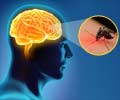The World Encephalitis Day 2017 is celebrated on the 22nd February 2017 to increase awareness about the potentially life-threatening encephalitis infection.
- Encephalitis is the inflammation of the brain that can have long-term consequences
- Adequate awareness can help to prevent cases of encephalitis
- The World Encephalitis Day 2017 gives an opportunity to increase awareness about the condition
- Encephalitis refers to inflammation of the brain that occurs as a result of an infection or an autoimmune response
- Infective encephalitis is often caused by viruses including enteroviruses, herpes simplex virus types 1 and 2, rabies virus, or arboviruses (viruses that are spread through mosquitoes, ticks and other arthropods). Arboviral encephalitis includes West Nile, Japanese, La Crosse, and St. Louis encephalitis. The Zika virus which has affected several children in South America in recent years has also been implicated as a cause of encephalitis in a few cases. Encephalitis may also be caused by bacteria, fungi, or parasites
- Spread of encephalitis can occur through several ways like through mosquito or tick bites or direct contact with secretions of an infected patient
- Encephalitis can affect individuals of any age – be it young children or adults or seniors. People with reduced immunity can suffer from serious consequences
- Encephalitis should be recognized early so that treatment can be started immediately and complications can be prevented. The symptoms and signs of encephalitis include high fever, and nervous system-related symptoms of neck stiffness, vomiting, confusion, seizures, inability to speak or move, and even coma. Analysis of the cerebrospinal fluid that surrounds the brain and the spinal cord, and brain scans like CT scan and MRI help to diagnose the condition
- Any condition that affects the brain is concerning. So also is encephalitis, which can have serious consequences. It can result in death or even disable the patient permanently though the patient with milder infection can recover completely. Long-term complications can include epilepsy, and memory, learning or personality problems. Adequate precautions should also be taken by people in close contact with the patient to prevent infection
- Some patients may relapse in case of incomplete treatment. Some forms of autoimmune encephalitis may also relapse, indicating the importance of following up the patient.
- Unfortunately, several people die due to encephalitis. Therefore, prevention is still a better option to treatment. Vaccines like meningococcal vaccine can prevent several forms of encephalitis and save several lives. Mosquito and tick bites should be avoided
- Rehabilitation of the patient is an important aspect following treatment. Since encephalitis can affect brain functions, it is necessary that the patient is helped to cope up with daily life in the long term through rehabilitation.
Reference:
- What is Encephalitis? - (https://www.worldencephalitisday.org/)
- Meningitis and Encephalitis Fact Sheet - (https://www.ninds.nih.gov/Disorders/Patient-Caregiver-Education/Fact-Sheets/Meningitis-and-Encephalitis-Fact-Sheet)
Source-Medindia












